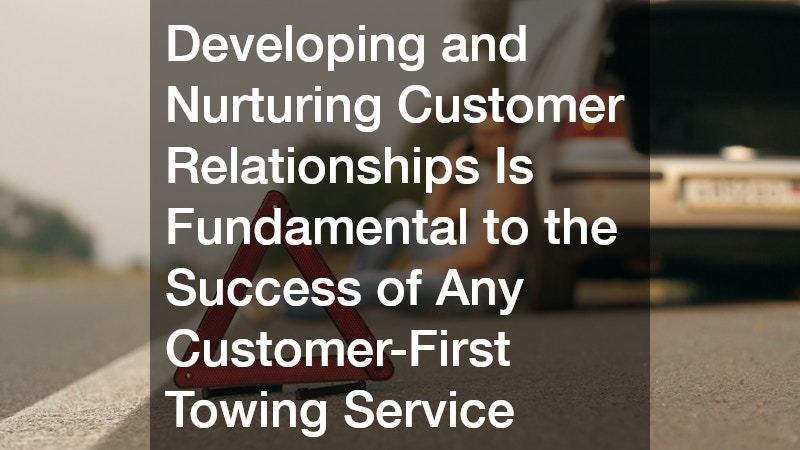Towing services have long been essential for assisting drivers in distress, but they haven’t always been known for prioritizing customer satisfaction. This article explores the importance of a customer-first approach in the towing industry and highlights how modern companies are setting new standards in service excellence. With a focus on empathy and reliability, these towing services are not only meeting customers’ immediate needs but also building long-lasting relationships.
Understanding the Towing Service Landscape
The towing industry has evolved significantly over the years, adapting to changing customer expectations. Traditionally seen as a last resort during vehicle breakdowns or accidents, towing services now strive to offer more than just a tow.
With the rise of consumer reviews and social media, customers are voicing their needs and experiences more openly, prompting service providers to enhance their offerings. As a result, many towing companies are beginning to focus on delivering a customer-first experience, recognizing that their reputation and success depend on satisfied clients.
One of the key challenges in the industry is the unpredictability of service demands, often requiring fast response times and effective communication. Towing providers understand that when customers call for help, they are often in stressful situations. Prioritizing empathy and clear communication can significantly improve customer satisfaction by easing their worries. By investing in training programs that emphasize these soft skills, companies can ensure that their employees offer not only technical expertise but also exceptional customer service.
Embracing technology has played a crucial role in transforming the towing experience. From quick-dispatch apps to real-time tracking systems, technology allows companies to provide more transparent and efficient services. Customers can now track their service arrival times and receive updates, which reduces anxiety and builds trust in the towing company’s reliability. These advances signify a shift in the towing sector towards more customer-centric solutions.
The Importance of Empathy and Support
Support extends beyond merely towing a vehicle; it encompasses offering guidance and assurance throughout the process. Providing customers with detailed explanations of what to expect and addressing any concerns they might have can make a significant difference. Such support reassures customers that they are in capable hands, leading to enhanced trust and satisfaction. Effective support may also include offering additional services like vehicle diagnostics or alternative transportation arrangements.
Training staff to deliver empathetic and supportive service is pivotal in achieving a customer-first model. Employees equipped with these skills are better prepared to handle challenging situations with professionalism and care. Consistent feedback mechanisms further enhance these initiatives by allowing companies to refine their services based on customer experiences. Ultimately, the goal is to transform what is often a negative experience into one that leaves customers feeling valued and respected.
Technological Integration for Improved Services
Incorporating technology into towing businesses can revolutionize customer experiences by enhancing efficiency and transparency. For instance, mobile apps that facilitate swift service requests and updates ensure that customers remain informed and relaxed during a stressful time. These apps can also offer estimated arrival times, invoice previews, and service satisfaction reviews. Such features bring a sense of control to customers, who appreciate the seamless integration of technology into service delivery.
Another important aspect of technological integration is the use of GPS and communication systems that aid drivers in navigating efficiently and understanding the needs of their customers. Real-time tracking technology enables towing businesses to optimize routes, reducing wait times for clients and improving overall service delivery. This technology empowers companies to address customer queries regarding estimated time arrivals with precision, enhancing their credibility and reliability.
Finally, technology facilitates enhanced record-keeping and data analysis, allowing towing companies to continuously improve their services. By monitoring key performance indicators, service providers can identify areas for improvement and develop strategies to increase customer satisfaction. Data analytics also offer insights into customer preferences and behaviors, enabling companies to tailor their services to meet the specific needs of their clientele, thus further reinforcing a customer-first approach.
Building Long-lasting Customer Relationships
Developing and nurturing customer relationships is fundamental to the success of any customer-first towing businesses. This concept focuses on transforming one-time interactions into enduring partnerships through exceptional service and follow-up. Regular communication, attentive listening, and personalized service make customers feel valued, encouraging loyalty and repeat business. Towing companies that prioritize relationship-building efforts can distinguish themselves in a competitive market.
One strategy to build these long-term connections is through customer feedback and engagement initiatives. By soliciting and acting on feedback, companies signal that they value customer opinions and are committed to continuous improvement. Personalized follow-ups after services ensure any residual concerns are addressed and underscore the company’s dedication to customer satisfaction. These efforts contribute to a positive reputation, fostering goodwill and leading to customer referrals.
The Future of Towing with a Customer-First Mindset
As the towing industry continues to evolve, a customer-first approach remains critical for companies aiming to succeed in a competitive landscape. By prioritizing empathy, support, and technological integration, towing business can transform adverse situations into positive experiences for their customers. This shift not only enhances customer satisfaction but also encourages loyalty and repeat business. As more companies adopt this model, the towing industry will see a more reliable and consumer-friendly future.
Ultimately, the future of towing services lies in their ability to embrace a customer-first mindset, prioritizing the welfare and satisfaction of those they serve. As technology advances and customer expectations evolve, towing businesses must adapt to these changes and continue to innovate. By doing so, they pave the way for substantial growth and success, driven by a steadfast commitment to serving their customers through exceptional experiences.




